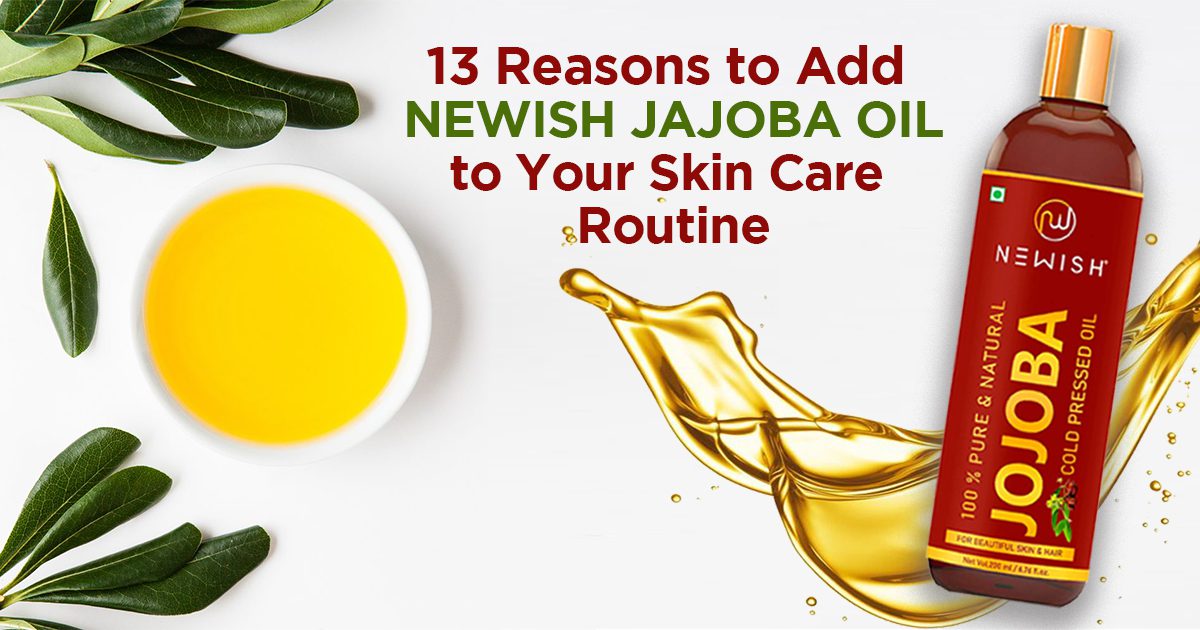What is jojoba oil?
The jojoba plant is a hearty, perennial plant that grows in North America. Not only does it thrive in the harsh, desert climates that could kill most living things, but it also produces a nut with many healing properties.
The nut of the jojoba plant can be made into an oil. Jojoba oil is gentle enough to be used as a carrier oil to mix with other essential oils. You can also use it on its own.
Many people use jojoba oil as part of their skin care routine. And there are good reasons for that. There’s plenty of evidence supporting the use of pure jojoba oil as a remedy for acne, dry skin, and countless other skin conditions.
Jojoba oil has a variety of healing properties that may make it effective in treating skin conditions like acne, eczema, and psoriasis.
You can enjoy its benefits by using it as a cleanser, moisturizer, or spot treatment. It can typically be used anywhere on your body, including your face, without being diluted.
If you develop a rash or other allergic response, discontinue use.
Some interesting reasons as why JAJOBA oil should be in your daily routine are as under:

1. It’s moisturizing
Jojoba oil is a humectant ingredient Trusted Source. This means that it works to seal your skin with a protective barrier to keep it from losing moisture. This may help prevent bacterial infections, acne, and dandruff from forming. It helps in retaining or preserving moisture.
2. It’s antibacterial
Jojoba oil contains antimicrobial and antifungal properties. While lab tests Trusted Source found that jojoba oil doesn’t kill all bacterial or fungal species, it does kill certain bacteria and fungi that can cause salmonella, an E. coli infection, and candida. So Jajoba oil is surely an antibacterial in nature.
3. It’s an antioxidant
Jojoba oil contains natural forms of vitamin E. This vitamin works with your skin Trusted Source as an antioxidant. This means that jojoba oil can help your skin fight oxidative stress caused by everyday exposure to pollutants and other toxins. So you can safely include in your daily skin care routine.
4. It’s noncomedogenic
Although jojoba oil is a botanical substance, its makeup is so similar to the oil (sebum) your body naturally produces that your skin can’t tell the difference.
This makes it less likely to build up on your skin and clog your pores, leading to fewer breakouts and less severe acne.
5. It’s hypoallergenic
On a molecular level, jojoba oil is a wax. Although it can be absorbed into your skin, its waxy nature allows it to create a soothing seal on the surface.
Unlike other botanical essential oils, jojoba oil is typically nonirritating. Allergic reaction is rare.
6. It helps control sebum production
Jojoba oil regulates sebum production because it’s so similar Trusted Source to the sebum that your body produces naturally.
When you put jojoba oil on your skin, your skin is soothed and moisturized. This sends a signal to your hair and sweat follicles that your skin doesn’t need additional sebum for hydration.
This keeps skin from looking oily and helps prevent acne caused by clogged pores.
7. It may help promote collagen synthesis
The antioxidants in jojoba oil may help your body produce collagen. Collagen is a protein that’s in your skin and joints as well as the parts of your body made of cartilage.
Collagen levels decrease Trusted Source as you get older. This is part of the reason your facial structure changes as you age. At least one study Trusted Source links antioxidants applied to the skin to improved collagen synthesis.
8. It may help speed up wound healing
Jojoba oil is a promising ingredient. Trusted Source in stimulating wound healing. Preliminary research shows. Trusted Source says that jojoba oil encourages your skin cells to bind together after they’ve been separated by a scratch or cut.
This may also be the reason for its ability to treat acne and acne scarring. These wound-healing properties could be connected to jojoba oil’s concentration of natural vitamin E.
9. It may help soothe eczema, psoriasis, and other drying skin conditions
Jojoba oil has anti-inflammatory and healing properties. Topical application may help relieve dryness, flaking, itching, and related symptoms.
People who have inflammatory skin conditions like psoriasis and eczema may find jojoba oil especially beneficial.
10. It may help soothe sunburns
Jojoba oil is a popular ingredient in some natural sunscreen products. One studyTrusted Source suggests that vitamin E, when combined with other antioxidants, can help protect your skin from sun damage. Jojoba oil contains both.
Sun damage can dehydrate your skin and cause flaking. Jojoba oil restores vitamin E, adds moisture, and promotes healing to soothe these symptoms of sunburns.
11. It may help treat acne
At least one clinical trial indicates that jojoba oil can help keep acne at bay. Jojoba oil has soothing anti-inflammatory agents, healing properties, is moisturizing, and is a natural antimicrobial.
These properties suggest that jojoba oil could help you avoid breakouts as well as promote healing for mild acne.
12. It may help reduce the appearance of fine lines and wrinkles
Oxidative stress can be linked Trusted Source to the appearance of fine lines and wrinkles. There’s no research that links jojoba to treating wrinkles and fine lines directly, but other plant products with antioxidant properties have been shown Trusted Source to improve the elasticity of skin.
This means that the antioxidant power of jojoba oil may help slow the signs of aging when used on your skin.
13. It may help minimize the appearance of scars
in detail, Vitamin E has long been recommended by health professionals to help with scarring. Research on whether this works — and, if so, to what extent — is still ongoing Trusted Source.
If you’d like to try vitamin E as a remedy to scarring, jojoba oil may prove to be beneficial in the healing process.
Basically, Jojoba oil’s natural wound-healing properties combined with its vitamin E content, could minimize the appearance of scars.
- How to use jojoba oil for better hair?
A) Condition hair: Applying it to your scalp and hair can hydrate individual hair strands and help lock in moisture, leaving your hair feeling soft and healthy
B) Controls dandruff:
Jojoba oil naturally contains palmitic acid and stearic acid, both of which are best for conditioning and protecting the hair. Depending on the severity of your dandruff, you could use jojoba oil as a pre-treatment before shampooing (say, letting it sit for 20 minutes before rinsing), or as a leave-in scalp conditioner post-shampoo.
C) Protect against damage:
The fatty acids in jojoba oil not only condition the hair, but protect it from styling tool-induced heat damage .They defend your hair against free radicals the same way they do your skin. For those with color-treated hair, adding jojoba oil to your repertoire can help extend the length of your color too. Additionally, to score these protective benefits, run a drop of two of jojoba oil through your hair before and after styling.
D) Promote hair thickness and growth: The vitamins and minerals found in jojoba oil (vitamins B and C, zinc, copper) provide nourishment to the hair and help keep it thick and growing. “The zinc that’s found in jojoba oil, for example, is vital for the tissue in the hair to grow. “It helps the follicles grow and maintains the functionality of the surrounding oil glands.”
E) Delay greying of hair: Copper deficiency can lead to loss of pigment and premature gray hair, and copper itself is currently being studied as a potential topical anti-aging compound. Because jojoba oil contains copper, along with protective antioxidants like vitamins C and E, applying it could help slow down this process and restore some of the lost copper.
How to use JAJOBA OIL for hair & skin
Unlike some other essential oils, jojoba oil doesn’t need to be dilute and can be apply directly to your skin.
Before using jojoba oil, or any cosmetic product, for the first time, you should do a patch test to make sure you’re not allergic. You can do a patch test by following these steps:
- On your inner forearm, apply three or four drops of jojoba oil.
- Cover the area with a bandage and wait 24 hours.
- Remove the bandage and check the skin underneath. If there’s no sign of hives, redness, or irritation, you’re in the clear.
The way you use jojoba oil depends on your desired result. You can use it as a lip balm to soothe dry, cracked lips, or you can apply it all over your face before bed as an anti-aging serum.
In brief, you may also mix jojoba oil with other natural acne-fighting ingredients into a DIY mask treatment to improve acne.
So, Jojoba oil is safe to use around your eye area, unlike most other ingredients, which makes it a popular makeup remover for oil-based makeup.
Potential side effects and risks
Since jojoba oil is hypoallergenic, it’s generally consider safe to apply topically.
However, there are some rare cases in which jojoba oil has caused an allergic reaction. Symptoms included hives and itching.
To avoid these side effects, make sure to do a patch test (described above) before using jojoba oil.









